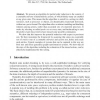Free Online Productivity Tools
i2Speak
i2Symbol
i2OCR
iTex2Img
iWeb2Print
iWeb2Shot
i2Type
iPdf2Split
iPdf2Merge
i2Bopomofo
i2Arabic
i2Style
i2Image
i2PDF
iLatex2Rtf
Sci2ools
131
click to vote
CONCUR
2008
Springer
2008
Springer
Dynamic Partial Order Reduction Using Probe Sets
We present an algorithm for partial order reduction in the context of a countable universe of deterministic actions, of which finitely many are enabled at any given state. This means that the algorithm is suited for a setting in which resources, such as processes or objects, are dynamically created and destroyed, an a priori bound. The algorithm relies on abstract enabling and disabling relations among actions, rather than associated sets of concurrent processes. It works by selecting so-called probe sets at every state, and backtracking in case the probe is later discovered to have missed some possible continuation. We show that this improves the potential reduction with respect to persistent sets. We then instantiate the framework by assuming that states are essentially sets of entities (out of a countable universe) and actions test, delete and create such entities. Typical examples of systems that can be captured in this way are Petri nets and (more generally) graph transformation s...
Algorithm | CONCUR 2008 | Countable Universe | Distributed And Parallel Computing | Partial Order Reduction |
Related Content
| Added | 18 Oct 2010 |
| Updated | 18 Oct 2010 |
| Type | Conference |
| Year | 2008 |
| Where | CONCUR |
| Authors | Harmen Kastenberg, Arend Rensink |
Comments (0)

